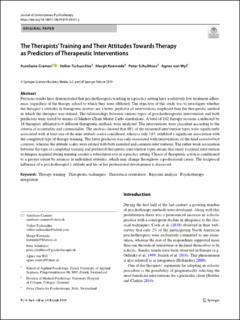Please use this identifier to cite or link to this item:
https://doi.org/10.21256/zhaw-3151Full metadata record
| DC Field | Value | Language |
|---|---|---|
| dc.contributor.author | Crameri, Aureliano | - |
| dc.contributor.author | Tschuschke, Volker | - |
| dc.contributor.author | Koemeda, Margit | - |
| dc.contributor.author | Schulthess, Peter | - |
| dc.contributor.author | von Wyl, Agnes | - |
| dc.date.accessioned | 2019-07-19T06:41:01Z | - |
| dc.date.available | 2019-07-19T06:41:01Z | - |
| dc.date.issued | 2019 | - |
| dc.identifier.issn | 0022-0116 | de_CH |
| dc.identifier.issn | 1573-3564 | de_CH |
| dc.identifier.uri | https://digitalcollection.zhaw.ch/handle/11475/17521 | - |
| dc.description | Erworben im Rahmen der Schweizer Nationallizenzen (http://www.nationallizenzen.ch) | de_CH |
| dc.description.abstract | Previous results have demonstrated that psychotherapists working in a practice setting have a relatively low treatment adherence, regardless of the therapy school to which they were affiliated. The objective of this study was to investigate whether the therapist’s attitudes in therapeutic matters are a better predictor of interventions employed than the therapeutic method in which the therapist was trained. The relationships between various types of psychotherapeutic intervention and both predictors were tested by means of Markov Chain Monte Carlo simulations. A total of 162 therapy sessions conducted by 18 therapists affiliated to 6 different therapeutic methods were analyzed. The interventions were classified according to the criteria of essentiality and commonality. The analysis showed that 40% of the examined intervention types were significantly associated with at least one of the nine attitude scales considered, whereas only 14% exhibited a significant association with the completed type of therapy training. The latter predictor was only associated with interventions of the kind essential/not common, whereas the attitude scales were related with both essential and common interventions. The rather weak association between the type of completed training and preferred therapeutic intervention types means that many essential intervention techniques acquired during training assume a subordinate role in a practice setting. Choice of therapeutic action is conditioned to a greater extent by nuances in individual attitudes, which may change throughout a professional career. The reciprocal influence of a psychotherapist’s attitude and his or her professional development is discussed. | de_CH |
| dc.language.iso | en | de_CH |
| dc.publisher | Springer | de_CH |
| dc.relation.ispartof | Journal of Contemporary Psychotherapy | de_CH |
| dc.rights | Licence according to publishing contract | de_CH |
| dc.subject | Therapy training | de_CH |
| dc.subject | Therapeutic technique | de_CH |
| dc.subject | Theoretical orientation | de_CH |
| dc.subject | Bayesian analysis | de_CH |
| dc.subject | Psychotherapy integration | de_CH |
| dc.subject.ddc | 616.89: Psychische Störungen, klinische Psychologie und Psychiatrie | de_CH |
| dc.title | The therapists’ training and their attitudes towards therapy as predictors of therapeutic interventions | de_CH |
| dc.type | Beitrag in wissenschaftlicher Zeitschrift | de_CH |
| dcterms.type | Text | de_CH |
| zhaw.departement | Angewandte Psychologie | de_CH |
| zhaw.organisationalunit | Psychologisches Institut (PI) | de_CH |
| dc.identifier.doi | 10.21256/zhaw-3151 | - |
| dc.identifier.doi | 10.1007/s10879-019-09421-y | de_CH |
| zhaw.funding.eu | No | de_CH |
| zhaw.issue | 1 | de_CH |
| zhaw.originated.zhaw | Yes | de_CH |
| zhaw.pages.end | 76 | de_CH |
| zhaw.pages.start | 67 | de_CH |
| zhaw.publication.status | publishedVersion | de_CH |
| zhaw.volume | 50 | de_CH |
| zhaw.embargo.end | 2024-03-31 | de_CH |
| zhaw.publication.review | Peer review (Publikation) | de_CH |
| zhaw.webfeed | Klinische Psychologie | de_CH |
| zhaw.funding.zhaw | Praxisstudie ambulante Psychotherapie Schweiz (PAP-S) | de_CH |
| zhaw.author.additional | No | de_CH |
| Appears in collections: | Publikationen Angewandte Psychologie | |
Files in This Item:
| File | Description | Size | Format | |
|---|---|---|---|---|
| Crameri2019_Article_TheTherapistsTrainingAndTheirA.pdf | 609.09 kB | Adobe PDF |  View/Open |
Show simple item record
Crameri, A., Tschuschke, V., Koemeda, M., Schulthess, P., & von Wyl, A. (2019). The therapists’ training and their attitudes towards therapy as predictors of therapeutic interventions. Journal of Contemporary Psychotherapy, 50(1), 67–76. https://doi.org/10.21256/zhaw-3151
Crameri, A. et al. (2019) ‘The therapists’ training and their attitudes towards therapy as predictors of therapeutic interventions’, Journal of Contemporary Psychotherapy, 50(1), pp. 67–76. Available at: https://doi.org/10.21256/zhaw-3151.
A. Crameri, V. Tschuschke, M. Koemeda, P. Schulthess, and A. von Wyl, “The therapists’ training and their attitudes towards therapy as predictors of therapeutic interventions,” Journal of Contemporary Psychotherapy, vol. 50, no. 1, pp. 67–76, 2019, doi: 10.21256/zhaw-3151.
CRAMERI, Aureliano, Volker TSCHUSCHKE, Margit KOEMEDA, Peter SCHULTHESS und Agnes VON WYL, 2019. The therapists’ training and their attitudes towards therapy as predictors of therapeutic interventions. Journal of Contemporary Psychotherapy. 2019. Bd. 50, Nr. 1, S. 67–76. DOI 10.21256/zhaw-3151
Crameri, Aureliano, Volker Tschuschke, Margit Koemeda, Peter Schulthess, and Agnes von Wyl. 2019. “The Therapists’ Training and Their Attitudes towards Therapy as Predictors of Therapeutic Interventions.” Journal of Contemporary Psychotherapy 50 (1): 67–76. https://doi.org/10.21256/zhaw-3151.
Crameri, Aureliano, et al. “The Therapists’ Training and Their Attitudes towards Therapy as Predictors of Therapeutic Interventions.” Journal of Contemporary Psychotherapy, vol. 50, no. 1, 2019, pp. 67–76, https://doi.org/10.21256/zhaw-3151.
Items in DSpace are protected by copyright, with all rights reserved, unless otherwise indicated.